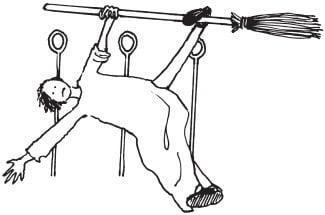THE GAME OF QUIDDITCH continues to thrill and obsess its many fans around the world. Nowadays every purchaser of a Quidditch match ticket is guaranteed to witness a sophisticated contest between highly skilled fliers (unless of course the Snitch is caught in the first five minutes of the match, in which case we all feel slightly short-changed). Nothing demonstrates this more than the difficult moves that have been invented over its long history by witches and wizards eager to push themselves and the game as far as they can go. Some of these are listed below.
Bludger Backbeat
A move by which the Beater strikes the Bludger with a backhanded club swing, sending it behind him or her rather than in front. Difficult to bring off with precision but excellent for confusing opponents.
Dopplebeater Defence
Both Beaters hit a Bludger at the same time for extra power, resulting in a Bludger attack of greater severity.
Double Eight Loop
A Keeper defence, usually employed against penalty takers, whereby the Keeper swerves around all three goal hoops at high speed to block the Quaffle.
Hawkshead Attacking Formation
Chasers form an arrowhead pattern and fly together towards the goalposts. Highly intimidating to opposing teams and effective in forcing other players aside.
Parkin’s Pincer
So named for the original members of the Wigtown Wanderers, who are reputed to have invented this move. Two Chasers close in on an opposing Chaser on either side, while the third flies headlong towards him or her.
Plumpton Pass
Seeker move: a seemingly careless swerve that scoops the Snitch up one’s sleeve. Named after Roderick Plumpton, Tutshill Tornado Seeker, who employed the move in his famous record-breaking Snitch catch of 1921. Although some critics have alleged that this was an accident, Plumpton maintained until his death that he had meant to do it.
Porskoff Ploy
The Chaser carrying the Quaffle flies upwards, leading opposing Chasers to believe he or she is trying to escape them to score, but then throws the Quaffle downwards to a fellow Chaser waiting to catch it. Pinpoint timing is of the essence. Named after the Russian Chaser Petrova Porskoff.
Reverse Pass
A Chaser throws the Quaffle over one shoulder to a team member. Accuracy is difficult.
Sloth Grip Roll
Hanging upside down off the broom, gripping tightly with hands and feet to avoid a Bludger.
Starfish and Stick
Keeper defence: the Keeper holds the broom horizontally with one hand and one foot curled around the handle, while keeping all limbs outstretched (see Fig. G). The Starfish without stick should never be attempted.

Fig. G
Transylvanian Tackle
First seen at the World Cup of 1473, this is a fake punch aimed at the nose. As long as contact is not made, the move is not illegal, though it is difficult to pull off when both parties are on speeding broomsticks.
Woollongong Shimmy
Perfected by the Australian Woollongong Warriors, this is a high-speed zigzagging movement intended to throw off opposing Chasers.
Wronski Feint
The Seeker hurtles towards the ground pretending to have seen the Snitch far below, but pulls out of the dive just before hitting the pitch. Intended to make the opposing Seeker copy him and crash. Named after the Polish Seeker Josef Wronski.
There can be no doubt that Quidditch has changed beyond all recognition since Gertie Keddle first watched ‘those numbskulls’ on Queerditch Marsh. Perhaps, had she lived today, she too would have thrilled to the poetry and power of Quidditch. Long may the game continue to evolve and long may future generations of witches and wizards enjoy this most glorious of sports!















